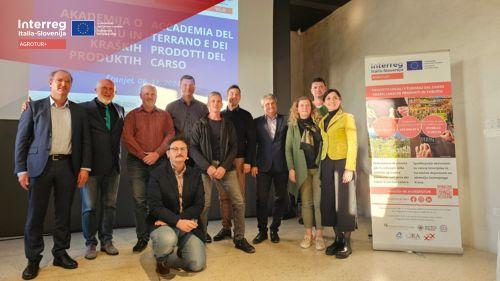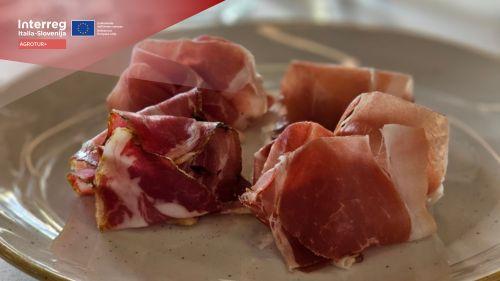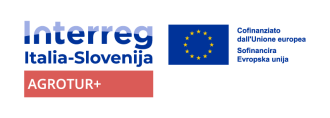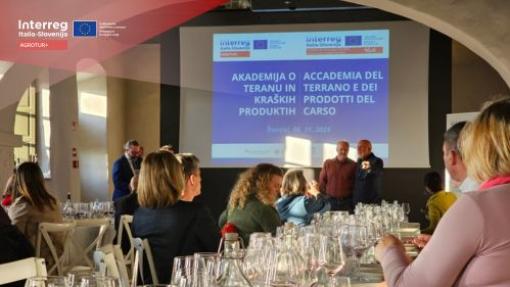The AGROTUR+ project, as part of the new wine celebrations in the Karst region, organized the usual professional symposium "Terrano Academy and Karst Products." The event, held on Wednesday, November 6th at Štanjel Castle, brought together Karst viticulturists and other local suppliers, students from the Faculty of Viticulture and Enology, media, and the professional public. Numerous experts from Italy and Slovenia highlighted the influence of climate change, geographical location, and water stress on grape quality and consequently on wine. The benefits of moderate wine consumption on human health and consumer opinions on "Kraški pršut" were also presented. The event concluded with a guided tasting workshop "FOOD LAB," where participants explored the gastronomic delights of the Karst.

The AGROTUR+ project continues over a decade of uninterrupted activities of the Agrotur and Agrotur II projects within the Interreg Italy-Slovenia Program, aiming to develop further agricultural and tourism activities in the transboundary Karst region. For this purpose, it organizes numerous cross-border activities, including the annual "Terrano Academy and Karst Products" event.
The event, organized by the Karst and Brkini Development Agency (ORA d.o.o.) in collaboration with other project partners, began with a professional session. Luca Dellisanti from Perleuve company illustrated the specifics of the current wine year in the Karst. Growth, the emergence of diseases, the impact of water stress, and grape maturation were monitored at nine locations from the end of May to October, with results regularly published in weekly reports accessible on the e-karst.eu web platform. One of the main findings, shown by the analysis of meteorological charts from past years, is that extremely dry years are rare, however, precipitation throughout the year is not distributed as viticulturists would like.
Dr. Klemen Lisjak from the Slovenian Agricultural Institute highlighted the importance of choosing the most appropriate time for harvesting in his speech on the maturation and polyphenolic potential of Refošk grapes of the 2024 vintage. This year was a very early season with a short ripening phase, and September rains prevented viticulturists from waiting for the optimal time for harvesting, thus obtaining grapes with ideal aromatic and phenolic maturity.
Professor Lorena Butinar from the University of Nova Gorica presented in her speech the activity of lactic acid bacteria in last year's Terano vintage. The University of Nova Gorica team analyzed 22 samples to detect the presence of unwanted volatile phenols, indicators of wine health. Comparisons with results from previous research show that most viticulturists effectively manage the malolactic fermentation process and that in the Karst, poor quality wines are becoming increasingly rare.
Professor Sabina Passamonti from the University of Trieste presented her research on the effects of anthocyanins in the human body. Their interest is primarily directed at their impact on the liver, particularly on the secretion of bilirubin, crucial for the health of the cardiovascular system. Their results indicate that red wine pigments do not damage the liver but may cause a slight increase in bilirubin in the blood, which has a positive impact on our health.
Professor Marjeta Čandek-Potokar presented a study on consumer opinions regarding "Kraški pršut" compared to innovative products. Results showed that "Kraški pršut" enjoys a great reputation among Slovenian consumers. In blind tests, Italian ham and of the Krškopolje pig received higher ratings compared to Karst and Istrian ham, while in tests where participants knew which ham they were evaluating, "Kraški pršut" scored the highest. Moreover, in choosing, consumers place more importance on appearance (colour, meatiness) than on structure/consistency, perceiving softer ham as less mature. The study also showed that Slovenian consumers prefer a heavier ham with a shorter salting period.
In the second part of the event, the guided tasting workshop "FOOD LAB" was held in collaboration with the "Borderless flavour" project, funded by the European Union from the Small Projects Fund GO! 2025 of the Interreg VI-A Italy-Slovenia 2021-2027 program, managed by EZTS GO. Participants were guided through the tasting of Karst wines, cheeses, and cured meats by Robi Jakomin (LAS Kras-Carso) and Stelio Smotlak (Slow Food), with the presentation of their products by some producers. Three exceptional kinds of cheese were presented: sheep's cheese from Antonič farm in Ceroglie, goat's cheese from Žerjal farm in Tomaj, and cow's cheese from Zidarič farm in Prepotto. Regarding the cured meats, four samples were present: Karst flower, two Karst hams of different ageing (all from Kras pršutarna), and steak from Bajta farm in Sales. Among the wines, Vitovska Kamen from Zidarič farm stood out, while the other 6 samples were characterized by Teran – sparkling wines from Bajta Salež and Kobala from Štanjel and four wines from Štoka (Krajna vas), Orel (Avber), Edi Kante (Prepotto), and Vinakras winery (Sežana). The tasting concluded with Karst Brinjevec from Ivo Šuc in Pliskovica.


